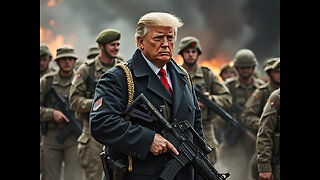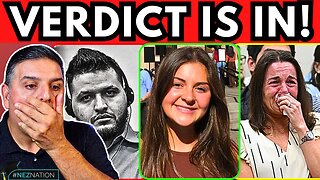Premium Only Content

Lawfare or Justice? The Polarizing Prosecution of Donald Trump
The legal battles surrounding Donald Trump have ignited a firestorm of political and social discourse, splitting public opinion and raising profound questions about the integrity of the legal system. With five ongoing cases ranging from civil liability to criminal allegations, Trump’s legal entanglements are often framed as either long-overdue accountability or orchestrated political persecution. The truth likely lies somewhere in between, but the implications of these cases extend far beyond Trump himself, cutting to the heart of democracy, the rule of law, and the balance of power in America.
This article aims to dissect the complexities of these cases, evaluate claims of bias and manipulation, and explore what this unprecedented legal spectacle reveals about the state of the nation.
The Legal Landscape: Breaking Down the Cases
1. Civil vs. Criminal Distinctions:
• The confusion between civil liability and criminal conviction is emblematic of the broader misunderstanding surrounding Trump’s legal woes. Civil cases, such as E. Jean Carroll’s defamation suit, result in financial penalties and reputational damage but do not carry criminal consequences. Criminal cases, like those concerning classified documents, involve potential prison time and long-term legal ramifications.
2. The Five-Pronged Legal Onslaught:
• E. Jean Carroll Case (Civil): Trump was found liable for sexual abuse and defamation. Critics argue this case was influenced by New York’s political leanings, with a jury drawn from a heavily anti-Trump demographic.
• New York Fraud Trial (Civil): Letitia James’ lawsuit accuses Trump and his organization of inflating property values. Critics highlight the lack of victims, as the banks involved reported no damages.
• Manhattan DA’s Hush Money Case (Criminal): Prosecuted by Alvin Bragg, this case has faced scrutiny for its reliance on novel legal interpretations.
• Georgia Election Interference Case (Criminal): Fani Willis’ indictment of Trump for alleged election interference has been criticized for its aggressive framing of his actions as a criminal conspiracy.
• Federal Classified Documents Case (Criminal): Jack Smith’s indictment hinges on Trump’s handling of sensitive documents, raising constitutional questions about presidential authority and immunity.
The Polarization of Justice
1. Selective Prosecution or Equal Accountability?
• Critics argue that Trump is being selectively targeted, pointing to politically motivated prosecutors and jurisdictions with overwhelmingly anti-Trump electorates. The sentiment that Trump is treated uniquely compared to other politicians accused of similar misconduct fuels claims of lawfare—a term denoting the use of legal systems to attack political opponents.
2. Weaponization of the Legal System:
• Trump supporters view these cases as emblematic of a broader trend: the weaponization of the legal system to suppress dissent and discredit opposition. They cite examples like the IRS targeting of conservative groups and the FBI’s handling of the Steele dossier to bolster their argument.
3. Public Perception of Bias:
• The overlapping jurisdictions and synchronized timing of these cases create a perception of coordination, whether intentional or coincidental. This undermines trust in the justice system, as many Americans view the legal proceedings as tainted by political bias.
The Stakes: Why This Matters Beyond Trump
1. Precedent Setting:
• These cases set a precedent for how former and current leaders can be prosecuted. If Trump is convicted or acquitted, it will shape the legal boundaries for future political figures, influencing the balance of accountability and executive privilege.
2. Impact on Public Trust:
• A justice system perceived as partisan erodes public trust, making it harder to hold leaders accountable without accusations of bias. Conversely, failure to prosecute legitimate wrongdoing risks normalizing corruption.
3. The Global Stage:
• The world is watching how America handles these cases. A fractured justice system and hyper-partisan prosecutions weaken America’s image as a beacon of democracy and rule of law.
The Case for Lawfare
1. Political Statements from Prosecutors:
• Statements from prosecutors, such as Letitia James campaigning on promises to “get Trump,” feed into the narrative of a politically motivated vendetta. Such rhetoric undermines the impartiality expected from legal authorities.
2. Timing and Coordination:
• The simultaneous progression of multiple cases creates an optics problem, suggesting a coordinated effort to overwhelm Trump’s ability to defend himself.
3. Double Standards:
• Critics point out that comparable allegations against other political figures, such as Joe Biden’s handling of classified documents or Hillary Clinton’s email controversy, have not resulted in similar prosecutorial zeal.
The Case for Accountability
1. No One Above the Law:
• Advocates argue that holding Trump accountable demonstrates the strength of American democracy. Ignoring potential misconduct due to political considerations would erode the rule of law.
2. Pattern of Behavior:
• Trump’s long history of controversial business practices, inflammatory rhetoric, and alleged misconduct has created a perception of impunity. Prosecuting him is seen as a corrective measure.
3. Protecting Democratic Norms:
• Cases like Georgia’s election interference trial highlight the need to safeguard democratic institutions from undue influence. Prosecuting attempts to undermine elections is crucial for maintaining public confidence in the democratic process.
A Divided Nation: Navigating the Fallout
1. The Spectacle of Trials:
• Regardless of outcomes, Trump’s legal battles have become a cultural phenomenon. These trials are as much about shaping public opinion as they are about legal accountability.
2. Implications for the 2024 Election:
• Trump’s legal troubles could either galvanize his base or alienate moderate voters, significantly impacting his political future and the broader political landscape.
3. The Bigger Question:
• The core issue is not just Trump’s guilt or innocence but the ability of the justice system to operate fairly in a polarized society. Can justice truly be blind when the stakes are so high?
Conclusion: Beyond Trump
The legal saga surrounding Donald Trump is not just about one man—it is a litmus test for the resilience of America’s democratic institutions. The charges and countercharges of bias, manipulation, and selective enforcement reflect a society deeply divided over the very principles it seeks to uphold.
As these cases unfold, the challenge lies in ensuring that justice is both done and seen to be done. Whether Trump emerges vindicated or convicted, the ultimate verdict will not be rendered in a courtroom but in the collective conscience of a nation struggling to reconcile its ideals with its realities.
-
 2:07:25
2:07:25
Steven Crowder
4 hours agoBREAKING: Russia Launches ICBM for First Time in History - What Happens Next?
297K160 -
 LIVE
LIVE
The Shannon Joy Show
4 hours ago🔥🔥While Americans Are Watching WWE Politics: Australia Is Ramping Up MANDATORY Digital ID🔥🔥
430 watching -
 LIVE
LIVE
LFA TV
14 hours agoTHE FIGHT IN ONLY BEGINNING! | LIVE FROM AMERICA 11.21.24 11am EST
5,582 watching -
 1:18:10
1:18:10
Graham Allen
5 hours agoPutin Vows Peace With Trump But WAR Under Biden!! + 400,000 Kids Are MISSING?!
97.6K179 -
 2:11:07
2:11:07
Matt Kohrs
12 hours agoMSTR Squeezes Higher, Bitcoin To $100k & Nvidia Post Earnings || The MK Show
47.6K1 -
 42:07
42:07
BonginoReport
6 hours agoNikki Haley's Hatred of Tulsi Gabbard Just Made Me a Bigger Fan (Ep.90) - 11/21/24
98.5K209 -
 28:41
28:41
Professor Nez
11 hours ago🚨BLOOD on their HANDS! The Man Biden & Kamala Flew In Finally Faces JUSTICE for Laken Riley
50.7K29 -
 1:06:27
1:06:27
2 MIKES LIVE
4 hours agoThe Mike Schwartz Show 11-21-2024
58.5K2 -
 15:07
15:07
PMG
13 hours ago $1.14 earned"President Trump's Cabinet is Amazing!"
61.2K -
 LIVE
LIVE
Vigilant News Network
16 hours agoHeavily-Vaxxed County Faces Grim Reality | The Daily Dose
823 watching